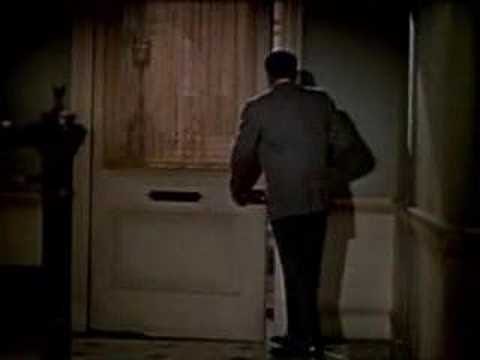
Title: Dial M for Murder
Director: Alfred Hitchcock
Screenwriter(s): Frederick Knott
Producer: Alfred Hitchcock
Distributor: Warner Bros.
In Theaters: May 29th, 1954
Run Time: 105 minutes
Color: Warner Color
Starring: Ray Milland, Grace Kelly, Robert Cummings & John Williams
Genre(s): crime/mystery/thriller
Storyline: In London, wealthy Margot Mary Wendice had a brief love affair with the American writer Mark Halliday while her husband and professional tennis player Tony Wendice was on a tennis tour. Tony quits playing to dedicate to his wife and finds a regular job. She decides to give him a second chance for their marriage. When Mark arrives from America to visit the couple, Margot tells him that she had destroyed all his letters but one that was stolen. Subsequently she was blackmailed, but she had never retrieved the stolen letter. Tony arrives home, claims that he needs to work and asks Margot to go with Mark to the theater. Meanwhile Tony calls Captain Lesgate (aka Charles Alexander Swann who studied with him at college) and blackmails him to murder his wife, so that he can inherit her fortune. But there is no perfect crime, and things do not work as planned. Written by Claudio Carvalho, Rio de Janeiro, Brazil
Movie Trailer:
My Review: I never have nor do I believe I ever will, see an Alfred Hitchcock movie I don’t like. He truly is the master of suspense. Many try to copy him, all have failed. To try and enter his mind to find out why and how he does what he does is impossible. His ability to draw his audience into this world he creates for us with such simplicity of character and dialogue and story is brilliance. There is too much flash and graphics today that the true art of movie making is gone. Hitchcock knew how to draw out the best in his actors so much so that their surrounds were often inconsequential until you saw what he wanted you to see.
This movie was probably one of Hitchcock’s least favorites. If not for his having Grace Kelly in this movie, whom he adored, as much for her blonde hair as for her acting ability. Why was it his least favorite? Well, because Warner Bros. insisted he film the entire movie in 3-D. Back in the early 1950’s 3-D cameras were huge and not easily moveable. I’m sure this would have annoyed Hitchcock who just about pioneered the idea of moving around a camera in ways no one ever thought possible. He would have had very little say-so on how a scene would be or could be filmed. And honestly, I still don’t see the appeal of a 3-D movie with real people. Simply because I would never want to own a 3-D television so the only time I would see it as such would be if I saw it in the movie theater. Every time I see this movie and remember it was filmed in 3-D it does answer a lot of visual questions. You wonder why certain scenes were filmed on that angle? For the purpose of 3-D. But then you find yourself looking for all the instances where a person or an object would have that 3-D affect and I can never remember them all. Only the one shown on the movie poster actually.
Aside from the 3-D aspect, which you will never see unless they remaster and rerelease the movie as it was intended to be seen, it was a great story as told. The idea that a man should want to kill his wife in order to inherit her money is not a new one. It’s been gone over countless times in books, movies, and television shows. Hardly ever does the husband get away with it. Yet, the arrogance of a man shows through in spades when the idea enters their minds and they try it anyway. In this movie Ray Milland is the has been tennis pro who is living off his wife’s money. Back then, a man living off his wife, I thought, was not something to be ashamed of? I thought it wasn’t until much later that men developed pride and a spine and wanted to make their own money and way in the world? Maybe I’m wrong. In any case, the idea of how he could murder his wife and not get caught enters his mind. First there must be blackmail since he himself would not be killing her. There must be an alibi. And there must be a perfect time and place to commit what seems to be the perfect murder. He thinks he’s got everything working for him. No matter what hitches should come up, like his wife’s lover, whom he knows about, dropping in for a visit, he is more than able to role with the punches. Even coming up with a plan B when his original plan of killing his wife doesn’t happen. You see, if she is convicted of murder, then being her husband, he would become sole heir of her estate. But I’m giving too much away already.
All I ask is you try and solve the murder before the chief inspector reveals it all in the end. I promise you, it’s not an easy case to crack. How does the chief inspector figure out that the wife is innocent and that in fact the husband is the guilty party? It’s all in the details…
My Rating: A




